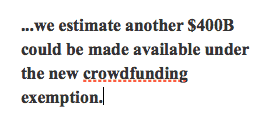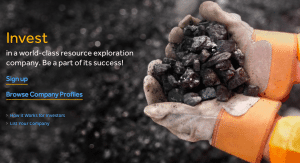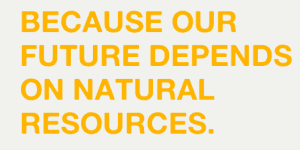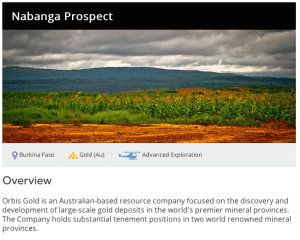 Crowdfunding started as a unique way to finance something small into something bigger – it has grown larger rather fast into funding or financing just about anything. Today the largest crowdfunding sites are more generalists. But we are now starting to see more niche focused sites gaining traction within targeted industries. Most visibly has probably been the film industry but others are moving up the ranks fast.
Crowdfunding started as a unique way to finance something small into something bigger – it has grown larger rather fast into funding or financing just about anything. Today the largest crowdfunding sites are more generalists. But we are now starting to see more niche focused sites gaining traction within targeted industries. Most visibly has probably been the film industry but others are moving up the ranks fast.
I must admit I know little about Commodities and Natural Resource projects outside of some light reading. But I found it quite interesting when I stumbled upon a forthcoming equity crowdfunding site that focuses specifically on Natural Resource Projects – ExplorationFunder.
I decided to reach out to ExplorationFunder Co-Founder and CEO Robert Leclerc to find out more about this fascinating niche crowdfunding site. An interesting fact is Natural Resource companies have a comparable investment profile to  technology companies – an opportunity ExplorationFunder is looking to leverage.
technology companies – an opportunity ExplorationFunder is looking to leverage.
Rob Leclerc is a highly accomplished individual with a PhD in Computational and Theoretical Evolutionary Biology from Yale and an MSc in Computer Science. ExplorationFunder is just the first of what he expects to be multiple verticles in the crowdfunding arena. In fact Funderverse, the umbrella company for ExplorationFunder is a finalist for Season II of “The Pitch”. If you are interested in helping out with a vote you may view it here on BetaBeat.
Dominique: You have a diverse background: Venture Capitalist at SeedRock, Scientist, Engineer. How did you decide to create a crowdfunding site for Natural Resources?
Rob: Natural resources have a comparable investment profile to tech. Annually, early stage natural resource companies raise over $17 Billion for exploration projects, compared to $21b deployed by tech Venture Capitalists (VCs), however the downstream M&A activity in natural resources is 3 times the size of tech M&A. And these are important investments.
If we woke up tomorrow without Facebook or twitter, it wouldn’t be the end of the world for most us, but if we
woke up tomorrow without natural resources it would be armageddon. By creating a crowdfunding platform for natural resources, we hope to bring greater investor awareness to the opportunities in the sector.
Dominique: There are several co-founders for ExplorationFunder. Can you explain the genesis of the site from initial concept?
Rob: The last few years there has been a real crisis of capital in the natural resources sector, and we originally looked at developing an investment marketplace back in 2010, but the broker dealers we were talking to assured us that the SEC would never allow online platforms to issue private securities, and certainly not to non-accredited investors. When the JOBS Act passed in 2012, we started to take a closer look at this to see if we could create a platform for natural resources.
Dominique: You expect to list both private and public companies on your site. Can you please discuss how you foresee the different equity investments evolving?
Rob: Liquidity is a major concern for private investing, and so the natural resources sector is interesting in that most companies use public vehicles to access the capital markets. And if a company is private, they’re probably looking to move to public vehicle. This is good for investors because they’ll have liquidity after a 4-6 month escrow period. As such, we feel that ExplorationFunder can provide an early indicator for the effectiveness of crowd managed investing.
Dominique: ExplorationFunder currently states that most listings are for companies which are not looking to raise capital. Is this a temporary situation? Do you see your platform evolving as a communication tool for these companies regardless of investment opportunities?
Rob: The reason small companies have such a hard time raising capital is that they really have no media channel to be discovered and to tell their story. Unless you’re company is in the Fortune 2,000 you’re not going to get on CNBC and be able reach out to your stakeholders and potential investors, or to build your audience. So even though a company may not be raising capital today, there will come a time when they need to go to the market and it would be best if they started building these relationships far in advance.
In fact, our broader vision is to create ‘Facebook of Companies‘, and ExplorationFunder is our first vertical in a portfolio of domain-focused funders produced by Funderverse (its parent company). The next vertical we’re working on is AgFunder.
Dominique: Will you offer only equity or will you offer debt as well?
Rob: Since most exploration companies do not generate cashflow our focus with be on equity offerings, although we will look at new opportunities as they arise to see if they make sense to investors on our platform.
Dominique: Which types of commodities do you expect to dominate the platform?
Rob: Precious metals have traditionally been the top exploration targets for junior explorers, in part because you don’t need huge CAPEX to extract bring them to market. When you start to get into iron ore, your talking about the need to transport millions of tonnes annually which involves railways and ports.
Dominique: Many exploration projects are capital intensive. What are your expectations in size of offerings?
Rob: The average private placement for a junior resource company is about $3M. However, Crowdfunding provides a company with more than capital, it provides them with a broad base of stakeholders that want to see the company succeed. It’s because of this marketing component that I expect the offerings to increase in size as companies seek a broader base of shareholders in which case we could be looking at offerings in the tens to hundreds of millions.
Dominique: These are global projects in diverse countries. Can you comment on political risk?
Rob: Natural resource exploration companies are often the first investors into a frontier market, and with great reward often comes great risk. Working at SeedRock I saw this first hand, first with a project in Mali, which had a coup in 2012, followed by some dubious back room dealings which cut us out of an offshore oil block in Namibia. Its very important that investors understand the risks. I would encourage investors to review the Frasier Institutes Survey of Mining Companies and Transparency International’s Corruption Perception Index so that they understand the risks that they face in frontier markets, and I would discourage an investor who wanted to allocate material portion of their portfolio to companies operating in these jurisdictions.
Dominique: Please discuss your expectations on due diligence. What type of role do you expect the crowd to play?
Rob: We have some of the top exploration geologists on our advisory board helping us review projects for their geological merits, the strength of the management team, and the reputation of the consultants. This first pass helps us get rid of the bad actors and projects with poor potential, but it is still up to the individuals investors to perform due diligence on a project.
From what we’re seeing on sites such as AngelList and CircleUp, projects that are able to capture a well known lead investor have a much better chance of getting funded. Investors can also see who has invested, and who is investing in these companies, and so we feel there are good tools in place for effective crowd management of the investment process. For example, a geologist might feel that the mineralization has great potential, but another individual close to the project recognizes that the claim resides on disputed lands, taken together the crowd might say that this is not a great investment opportunity after all.
Dominique: How will you market / promote your services to these types of companies? What is your market size?
Rob: Our focus is to start telling our story to the industry through conferences and trade publications. We’re also making heavy use of social media to identify and connect with leading figures and companies in the community. Early stage natural resource companies raise about $17b annually for exploration.
Dominique: Do you expect investors to be individuals with specific experience or exposure in Natural Resources?
Rob: We expect that a lot of our investors will have experience and exposure to the natural resources sector, but we’re going to be working hard to ensure that investors have educational resources to help them with their assessments.
Dominique: Will you require all companies to list their expectations regarding a liquidity event?
Rob: We’ll definitely encourage companies to divulge this information.
Dominique: What are your thoughts about secondary markets for these securities?
Rob: For the most part, the natural resource companies will be publicly traded so a secondary market might not have much utility.
Dominique: Have you modeled your approach off of any other existing sites?
Naval Ravikant from AngelList and Ryan Caldbeck from CircleUp have done an amazing job and have really helped set an example. Notably, both of these have a strong niche focus, with AngelList focusing on tech and CircleUp focusing on consumer goods.
Dominique: Do you have any comments on the Jobs Act and crowdfunding in general? Both for Accredited and non Accredited investors.
Rob: I think the JOBS Act will have a monumental impact on corporate America and will help level the playing field for SMEs which generate most of the job growth for America. In effect, large corporations have had a monopoly on capital, which gives them an unfair competitive advantage over smaller companies who may have better ideas, better execution, and better products, but who are unable to tap the capital markets to grow.
Still, in the absence of two-sided markets to connect investors with investment opportunities there still over $1T raised annually from accredited investors and we estimate another $400B could be made available under the new crowdfunding exemption. If we factor in efficient markets, and extrapolate this globally, we could be talking about $5-$10T being raised annually through these platforms.
Dominique: When do you expect your site to go live?
Rob: The site is currently in private beta while we continue to review companies and source investors. We’re expecting to go live around April with our first live crowdfunding.





